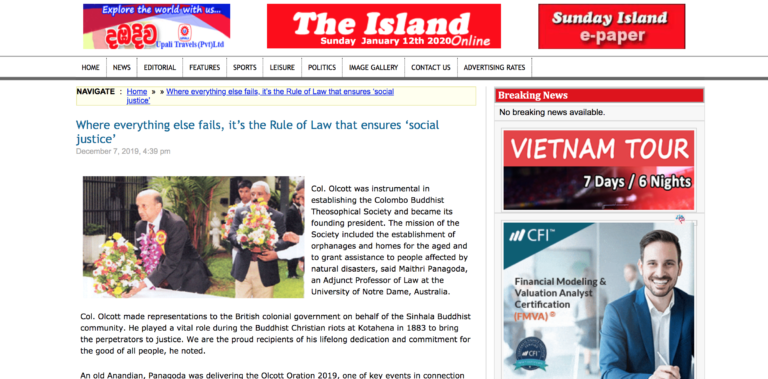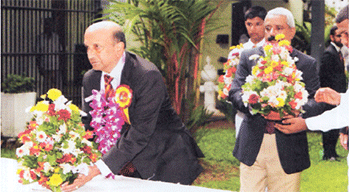
December 7, 2019, 4:39 pm
Col. Olcott was instrumental in establishing the Colombo Buddhist Theosophical Society and became its founding president. The mission of the Society included the establishment of orphanages and homes for the aged and to grant assistance to people affected by natural disasters, said Maithri Panagoda, an Adjunct Professor of Law at the University of Notre Dame, Australia.
Col. Olcott made representations to the British colonial government on behalf of the Sinhala Buddhist community. He played a vital role during the Buddhist Christian riots at Kotahena in 1883 to bring the perpetrators to justice. We are the proud recipients of his lifelong dedication and commitment for the good of all people, he noted.
An old Anandian, Panagoda was delivering the Olcott Oration 2019, one of key events in connection with the Founder’s Day celebrations of Ananda College, which marks its 133rd anniversary. The theme of this year’s Oration was “Achieving Social Justice through the Rule of Law”.
He further said that all human beings are entitled to justice. The law and its operation must be fair and it must treat everyone equally.
The functioning of institutions set up to ensure security, dignity and justice is paramount to the wellbeing of all human beings. When they fail, human beings become helpless, dependent and despondent. Global human rights discourses, whether by philosophers, religious leaders or jurists are built upon deep foundations based on these values, Panagoda outlined.
“Throughout my legal career in Australia, it has been my privilege to represent the voiceless, marginalized people, the disadvantaged. That is those who do not have a voice or have been silenced. In Australia, I felt honoured to represent the interests of the indigenous community i.e. Aborgines, who have a history of 40,000 years of existence in Australia”, he said.
Where everything else fails, it is the Rule of Law that will ensure social justice. It is incumbent, especially for those of us in the legal profession to strive for justice, for that has been the fundamental purpose of our learning the law,” he noted.
Continuing Panagoda further said: “My personal experience in the practical legal world in Sri Lanka is limited. However, I have been a keen observer of the operation of the Rule of Law in this country over the past 40 — 50 years. It would be a gross understatement to say that the concepts of Rule of Law and Separation of Powers in Sri Lanka have caused concern over the years.
“I recall being shocked and perplexed a few years ago when I read that there were proposals to set up a hybrid judicial system. Sri Lanka has produced some of the best legal minds in the world. We are a sovereign nation and we have a well established legal system.
“We have eminent lawyers and judges. Some are here in this audience, Why do we need outsiders to judge our issues? I pose the question, can we, as Anandians, be satisfied that we have done enough to safeguard the principles of social justice? Are we equipped to tackle the emerging social problems in an effective way, and give leadership to the younger generation?
“Do we maintain the values taught by our great educators, after entering university, becoming professionals in different fields, or by migrating to other countries? These are the issues we need to ponder over.
“I began by saying that it is almost 50 years since I left Ananda College. It was in 1969, half a century ago, that I last stepped on to this stage. It was the annual Prize Giving and the chief guest was the Governor General, William Gopallawa. Some of my fellow prize winners on that day are present here today. I particularly mention Sanjiva Senanayake and Prof. Sudharshan Seneviratne. There is a photograph of the three of us gazing at the Fritz Kunz Prize that Sanjiva and Sudharshan won. All three with shiny black hair. Something that all three of us seem to have sacrificed along the way.”
Source – http://www.island.lk/index.php?page_cat=article-details&page=article-details&code_title=215000

